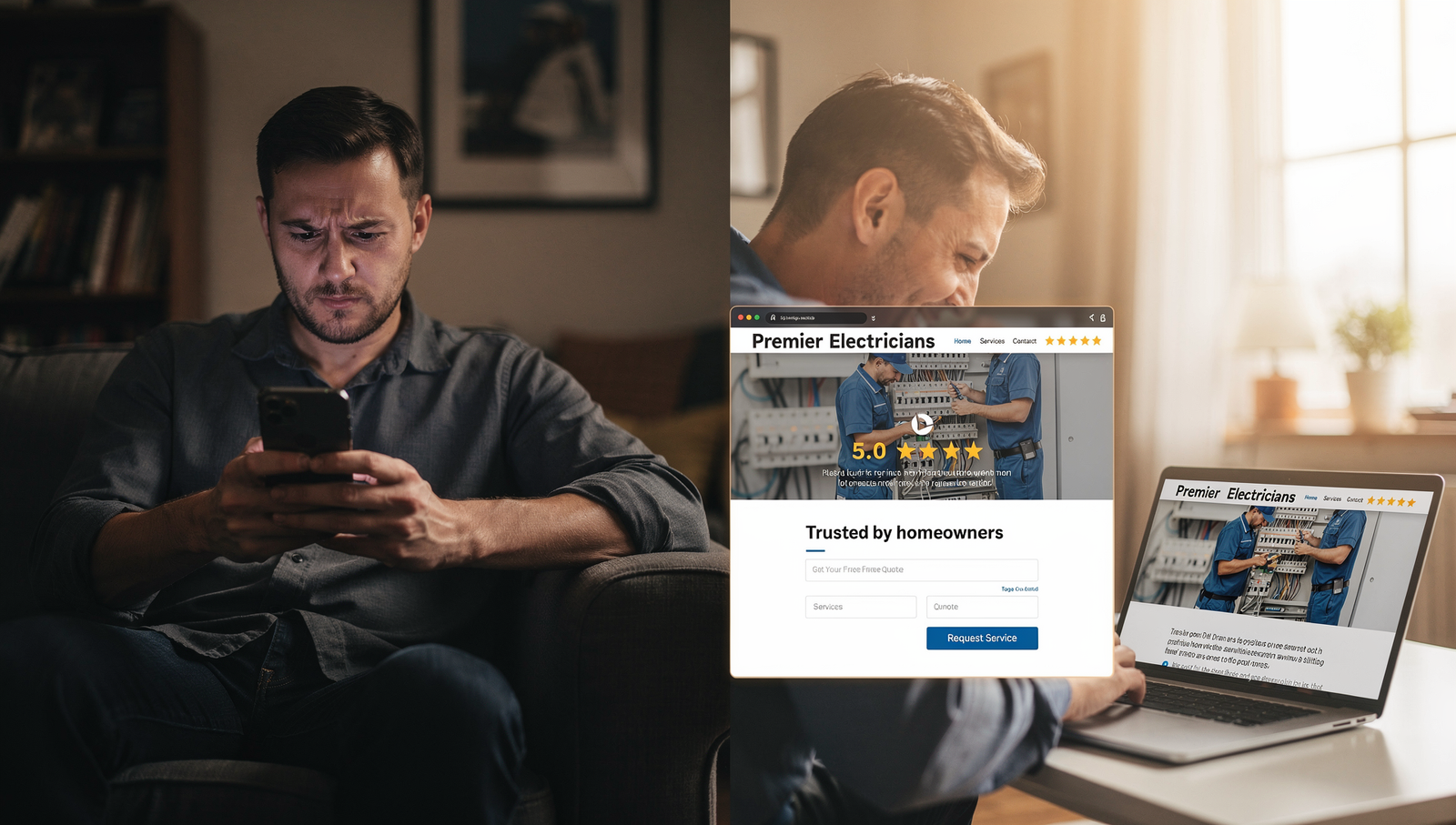7 Blog Length Secrets That Get Realtors More Traffic and Clients
Watch the video to learn how our realtor clients structure their blog posts for maximum ROI
Want More Clients Fast?
Steal This Website Rescue Kit to Get More Clients, More Calls, and More Sales on Autopilot
The question of blog post length for SEO in real estate is one of the most common debates in online marketing circles. Realtors often wonder: should I write short, snappy posts that people can skim, or should I invest the time in long, detailed posts that cover everything? The truth is that your post length can make or break your ability to show up on Google, attract the right clients, and ultimately close more deals.
Why Blog Post Length for SEO in Real Estate Matters
Let’s start with the obvious. Google doesn’t rank posts based on word count alone, but length does affect how well your content performs. Longer posts give you more space to target keywords, answer client questions, and build authority in your market. For Realtors, this means you can go beyond surface-level advice and give detailed, trustworthy guidance that makes you stand out from competitors.
Think of it like showing a luxury home. A quick drive-by might catch someone’s eye, but the real magic happens when you give them the full tour. Your blog should feel the same way: a place where potential clients get the answers they need without having to leave your website to search somewhere else.
The Ideal Blog Post Length for Real Estate SEO
Research consistently shows that the sweet spot for SEO blog posts is between 1,500 and 2,500 words. According to HubSpot, posts over 2,000 words tend to rank the best, get more backlinks, and perform better on social media. In real estate, this length is especially powerful because you’re competing with major players like Zillow, Realtor.com, and Redfin. A 400-word blog post won’t move the needle, but a 2,000-word powerhouse on “How to Sell Your Home in [Your City]” just might.
Here’s a simple breakdown:
Under 500 words: Too short. Google sees these as “thin content,” and they rarely rank.
500–1,000 words: Decent for quick updates, market snapshots, or neighborhood spotlights.
1,500–2,500 words: Best for ranking. This range gives you room for SEO-rich detail, examples, and actionable advice.
3,000+ words: Works well for pillar posts or ultimate guides that you want to serve as evergreen resources.
Real Estate Topics That Deserve Long-Form Content
Not every real estate blog post needs to be 2,000 words, but the ones that can generate leads should be. Some examples include:
How to Prepare Your Home for Sale in [Your City]
The Complete Guide to Buying a Home in [Your Market]
Neighborhood Comparisons: Which Area Is Right for You?
The Step-by-Step Process of Selling a Home
These are the types of posts that buyers and sellers actively search for on Google. A quick 500-word overview won’t cut it. They want answers, checklists, and insights that prove you’re the expert to hire.
For shorter posts like market updates or quick success stories, you can keep it under 1,000 words, but mix them in with longer, SEO-rich pieces to build a balanced blog strategy.
How Length Impacts SEO Performance
Blog length impacts more than keyword density. Here’s how it plays into SEO:
Time on Page: Longer posts encourage visitors to stay longer, signaling to Google that your content is valuable.
Backlinks: People are more likely to link to comprehensive guides than short blurbs.
Keyword Coverage: Longer posts naturally cover multiple related keywords, giving you more chances to rank.
Authority: A well-researched 2,000-word guide establishes you as a local market expert.
Balancing Length With Readability
One common Realtor worry is that long posts will scare readers away. But readability is the secret weapon here. Break up long posts with:
Subheadings
Bullet points
Photos or graphics
Short paragraphs (2–4 sentences max)
This way, a 2,000-word post feels like a comfortable walkthrough instead of a lecture. Think of it as staging a home: the length of the showing doesn’t matter if the experience is enjoyable.
The Role of Blog Post Length in Lead Generation
At the end of the day, your goal as a Realtor isn’t just to rank. It’s to generate leads. Longer posts give you more opportunities to place strategic calls-to-action. For instance:
A Home Value Tool at the end of a seller’s guide
A neighborhood tour video inside a relocation blog
A CTA to download a free checklist in a buyer’s guide
This is why Realtors who invest in blogging often see better ROI than those relying solely on social media or paid ads. And while ads matter (check out Facebook Ads vs Google Ads for Realtors for a breakdown), organic blog traffic is the gift that keeps on giving.

Data-Backed Proof of Blog Length Success
To put numbers behind it:
A study by Backlinko analyzed 11.8 million Google search results and found that the average first-page result contained 1,447 words.
HubSpot found that blog posts between 2,100 and 2,400 words received the most organic traffic.
Orbit Media reports that bloggers who write 2,000+ word posts are far more likely to report “strong results” than those who write shorter pieces.
This isn’t theory. The longer, high-quality posts actually work, and in a competitive field like real estate, they can be the edge that helps you outrank other local agents.
Mixing Short and Long Content for Realtors
So should you write every post at 2,000 words? Not necessarily. Think of your blog like your property portfolio. You need a mix of luxury listings, starter homes, and fixer-uppers. Some quick posts can keep your blog fresh and relevant, while the longer, in-depth guides serve as your cornerstone content.
For instance:
Short posts: Weekly market updates, client success stories, quick tips.
Medium posts: Neighborhood spotlights, “Top 5 Mistakes” type lists.
Long posts: Ultimate guides, seller funnels, and evergreen resources.
A Realtor with this mix looks active, authoritative, and trustworthy to both clients and Google.
Bringing It All Together
Blog post length for SEO in real estate isn’t about hitting an arbitrary word count. It’s about giving your readers the depth they need, packaged in a way that keeps them engaged. For Realtors, the sweet spot is around 1,500–2,500 words for most posts, with occasional shorter updates and longer guides sprinkled in. This strategy helps you rank, build trust, and capture more leads directly from your website.
And if you’re looking for ways to supercharge your blog strategy, check out resources like Best Free Tools for Realtors and other guides on topics like Real Estate Website Conversion Tips and How to Rank Higher on Google Maps. These will help you take your content game to the next level.
Final Thoughts
Writing longer, SEO-rich blog posts may take more effort, but it’s one of the most effective ways to get found online, showcase your expertise, and bring in clients who are ready to work with you. If you’d like help building a blog strategy that’s designed to rank and convert, book a free consultation with Digital Dream Homes today. We’ll make sure every post is structured for results, and we’ll show you exactly how to use the right blog post length for SEO in real estate to grow your business.
Matt Pieczarka
Want a Free Website Audit?
Fill out your information below and we will send you a personal screen share video of tips on how to make your actual website better!
See How Many Closings You're Losing to Zillow!
Click Here to Use our Calculator to See How Many Clients Zillow is Taking From You Per Year!
Some More Posts About Strategy and Growth…
- Marketing Plan For Small Business 2026 Every Owner Should Copy
- Benefits of Professional Website for Small Business: The Hidden Profits
- How to Get More Referrals for Small Local Business Fast
- Customer Retention Strategies Small Business Owners Never Hear About
- How Small Businesses Compete Online And Actually Win In 2026
- Blogging for Small Business Growth: 2026 Profit Multiplier
- Sales Funnel For Small Business Website That Prints Money
- What Is A Listicle And Why Your Website Desperately Needs One
- Strategic Website Design That Turns Small Business Clicks Into Clients
- The Simple Blueprint to Explosive Small Business Growth
9 Functional Medicine Website Designer Tips to Grow Faster
9 Functional Medicine Website Designer Tips to Grow Faster Watch the video to learn one psychological SEO trick to build more trust and get more leads from your website! Wan
7 Functional Medicine Website Design Moves That Get Patients
7 Functional Medicine Website Design Moves That Get Patients Watch the video to learn about the best layout to get more leads and patients guaranteed! Want More Clients Fast
11 Electrician Website Designers That Turn Clicks Into Calls
11 Electrician Website Designers That Turn Clicks Into Calls Watch the video to learn the best layout for best results! https://youtu.be/XaEbNPZxi0U?si=kT1Cru8S2SMJSPNx Want More C
11 Electrician Website Help Fixes That Turn Clicks Into Calls
11 Electrician Website Help Fixes That Turn Clicks Into Calls Watch the video to learn how to structure your website for the best return on investment! https://youtu.be/XaEbNPZxi0U
11 Electrician Web Design Company Questions to Ask
11 Electrician Web Design Company Questions to Ask Watch the video to learn the best website layout for the most lead conversions! https://youtu.be/XaEbNPZxi0U?si=SgxjOWdd7F6f4Mtg
13 Electrician Website Templates That Turn Clicks Into Paid Jobs
13 Electrician Website Templates That Turn Clicks Into Paid Jobs Watch the video to learn the best template layout for the best results! https://youtu.be/XaEbNPZxi0U?si=rGg1WlUWlmH
11 Electrician Website Services That Bring In More Calls
11 Electrician Website Services That Bring In More Calls Watch the video to learn the best website layout for the best results https://youtu.be/XaEbNPZxi0U?si=rGg1WlUWlmHTg73v Want
12 Electrician Website Upgrades That Win More Jobs
12 Electrician Website Upgrades That Win More Jobs Watch the video to learn the best website layout to get the most bang for your buck! https://youtu.be/XaEbNPZxi0U?si=uFqsnSFvenQ1
5 Electrician Website Design Company Upgrades That Win Jobs
5 Electrician Website Design Company Upgrades That Win Jobs Electrician website design that earns trust fast and drives more calls. See the must-have upgrades and book more jobs. h









